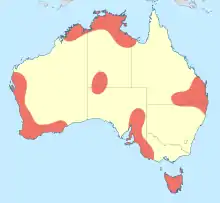Austroagrion cyane
Austroagrion cyane, the south-western billabongfly,[3] is a species of damselfly of the family Coenagrionidae.[4] Despite their common name, they have been found not only in south-western Australia,[3] but also in diverse locations across Australia.[5]
| South-western billabongfly | |
|---|---|
| Scientific classification | |
| Kingdom: | Animalia |
| Phylum: | Arthropoda |
| Class: | Insecta |
| Order: | Odonata |
| Suborder: | Zygoptera |
| Family: | Coenagrionidae |
| Genus: | Austroagrion |
| Species: | A. cyane |
| Binomial name | |
| Austroagrion cyane | |
 | |
Habit & Habitat
Austroagrion cyane are permanent residents of aquatic habitats. They prefer slow-moving water. The species grows to around 2–3 cm in length. Females are less common than males and are mostly attracted to ephemeral swamps.[6]
Gallery
.jpg.webp) Female wings
Female wings.jpg.webp) Male wings
Male wings
References
- Dow, R.A. (2017). "Austroagrion cyane". IUCN Red List of Threatened Species. 2017: e.T14263010A59256493. doi:10.2305/IUCN.UK.2017-1.RLTS.T14263010A59256493.en.
- Selys-Longchamps, E. (1876). "Synopsis des Agrionines, 5me légion: Agrion (suite). Le grand genre Agrion". Bulletin de la Classe des Science, Académie Royale de Belgique (in French). 42: 490–531, 952–991 [508] – via Biodiversity Heritage Library.
- Günther Theischinger & John Hawking (2006). The Complete Field Guide to Dragonflies of Australia. CSIRO Publishing. p. 92. ISBN 9780643090736.
- "Species Austroagrion cyane (Selys, 1876)". Australian Faunal Directory. Australian Biological Resources Study. 2012. Retrieved 6 April 2017.
- "Austroagrion cyane (Selys, 1876)". Atlas of Living Australia. 2017. Retrieved 29 May 2017.
- "South-western Billabongfly - Austroagrion cyane".
Further reading
| Wikimedia Commons has media related to Austroagrion cyane. |
- "Austroagrion cyane (Selys, 1876)". Atlas of Living Australia.
- Herbert Campion (1915). "A new Agrionine dragonfly from Northern Australia". Annals and Magazine of Natural History. 8th ser. 16 (92): 105–108. doi:10.1080/00222931508693694.
- D. F. Waterhouse (1954). "The rate of production of the peritrophic membrane in some insects" (PDF). Australian Journal of Biological Sciences. 7 (1): 59–72. PMID 13159751.
This article is issued from Wikipedia. The text is licensed under Creative Commons - Attribution - Sharealike. Additional terms may apply for the media files.
